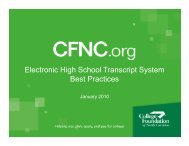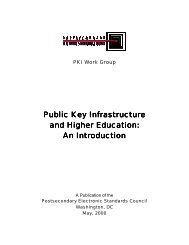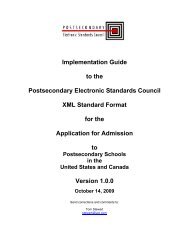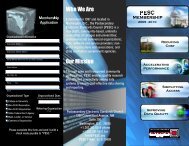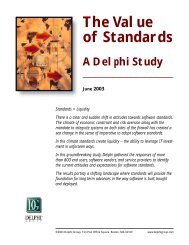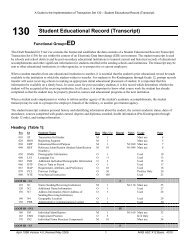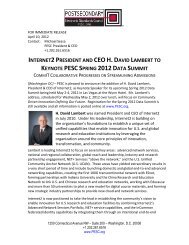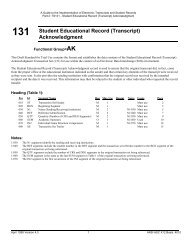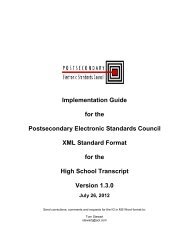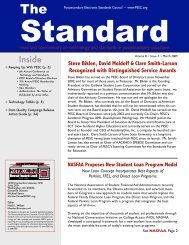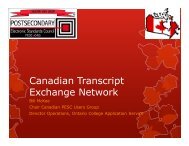February 2013 - PESC
February 2013 - PESC
February 2013 - PESC
Create successful ePaper yourself
Turn your PDF publications into a flip-book with our unique Google optimized e-Paper software.
FEB RUA RY 2 013<br />
Th e STANDARD NEWS A ND C OM M ENTA RY ON T EC HNOL OGY & STA NDA RDS IN EDUCA T ION<br />
Take flagship institutions, for example. As those<br />
campuses have relied less on public subsidies, their<br />
missions have shifted, especially when it comes to<br />
the number of in-state residents they serve.<br />
President Obama has attempted to start a national<br />
dialogue by calling for the United States to lead the<br />
world in its proportion of people with college<br />
credentials. While getting students to complete a<br />
degree or certificate rather than just accumulate<br />
credits is a worthy goal, simply pushing more<br />
people through colleges and universities is not the<br />
definition of a successful higher-education system<br />
in the minds of most experts.<br />
What is needed to truly serve the students of the<br />
future—and where state and federal leaders could<br />
really lend a hand—is to make the system more<br />
flexible for the next generation of learners and the<br />
institutions that serve them.<br />
Despite all the talk about how today’s traditional<br />
student is yesterday’s nontraditional student, we<br />
still have a financial-aid and regulatory system built<br />
on a one-size-fits-all model, with 15-week<br />
semesters and credit based on time spent in a<br />
classroom seat. As a result, it is difficult for<br />
institutions to consider new ways of serving the<br />
diverse needs of today’s students.<br />
My concern with all the news-media attention<br />
MOOCs are getting right now is that it is crowding<br />
out informed discussions of other innovative<br />
solutions to improve learning and control costs.<br />
One model that is getting scant attention, for<br />
instance, despite growing interest from traditional<br />
universities, is competency-based degrees.<br />
This year three traditional universities—Northern<br />
Arizona, Southern New Hampshire, and the<br />
Wisconsin system—are experimenting with<br />
degrees based on competencies. Officials at all<br />
three institutions believe a program based on what<br />
a student knows rather than seat time is the only<br />
way to begin clearing the logjam of time-pressed<br />
adults who need a postsecondary education.<br />
Building the programs, however, has required<br />
those officials to work alongside their accreditors<br />
and the Education Department to get around a<br />
myriad of rules.<br />
Those rules, of course, are designed to protect<br />
students and attach integrity to a college degree.<br />
But surely we can build a system that is both<br />
flexible and accountable. Otherwise there is little<br />
incentive for college leaders to follow a different<br />
path than the institutions ahead of them, or to look<br />
radically different.<br />
“Our students have all the information that we<br />
have as professors,” says Aaron Brower, special<br />
assistant to the president of the University of<br />
Wisconsin system (and a professor on the Madison<br />
campus). “So there is no premium on access to<br />
information.”<br />
Indeed, the whole notion of how students acquire<br />
information, toggling between devices and sources<br />
and working collaboratively, has transformed the<br />
learning process. The question now is how to build<br />
an educational system around this new information<br />
ecosystem. “It gives us the chance to put learning<br />
outcomes first and provides the opportunity for<br />
individual instruction,” Brower says.<br />
It also gives us the chance to build consensus<br />
around a diverse higher-education system that is<br />
flexible and responsive—yet accountable—to a<br />
generation of learners where one mode of teaching<br />
no longer fits all and where face-to-face, hybrid,<br />
and online-only education can perhaps peacefully<br />
coexist.<br />
<strong>2013</strong>-2014 APPLICATION PROCESSING<br />
SPECS FOR SOFTWARE DEVELOPERS<br />
William Leith, Service Director, Program<br />
Management, Federal Student Aid<br />
We are pleased to announce the posting of the<br />
final <strong>2013</strong>-2014 Application Processing System<br />
15 <strong>PESC</strong> UNLOC K ING T HE P OW ER OF DATA



